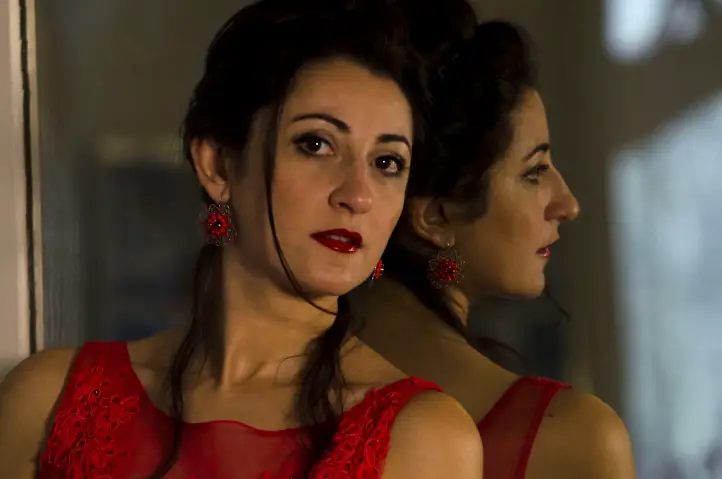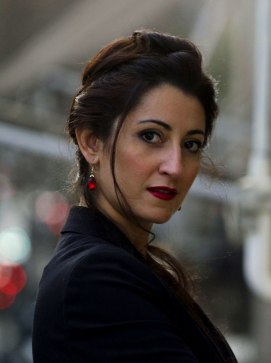Thursday December 22, 2016
Written by: Habiba Elhady
 The musical journey of prominent Egyptian opera singer Amira Selim started at the age of six. She grew up in a house where music and art were not only cherished, but also a profession. Amira was born to pioneering pianist and classical musician Marcelle Matta and Egypt’s renowned artist and art critic Ahmed Fouad Selim. Her parents’ artistic background played an instrumental role in shaping her upbringing and influencing her career. “I was always attracted to theaters, stages, acting, dancing,” says Amira during an interview in Paris, where she has been living and working for the past 15 years. “For as long as I can remember I have been going to operas with my parents. I took ballet lessons for 3 years, studied piano and even painted with the help of my father.” It was when she listened to a recording of Mozart’s Requiem and that she knew she “wanted to be one of these angelic moving voices.”
The musical journey of prominent Egyptian opera singer Amira Selim started at the age of six. She grew up in a house where music and art were not only cherished, but also a profession. Amira was born to pioneering pianist and classical musician Marcelle Matta and Egypt’s renowned artist and art critic Ahmed Fouad Selim. Her parents’ artistic background played an instrumental role in shaping her upbringing and influencing her career. “I was always attracted to theaters, stages, acting, dancing,” says Amira during an interview in Paris, where she has been living and working for the past 15 years. “For as long as I can remember I have been going to operas with my parents. I took ballet lessons for 3 years, studied piano and even painted with the help of my father.” It was when she listened to a recording of Mozart’s Requiem and that she knew she “wanted to be one of these angelic moving voices.”
 She started voice training and a repertoire in Italy with soprano Gabriella Ravazzi in 1993. She joined the Cairo Opera Company in 1997, and played Rosina, her first main role in Rossini’s “The Barber of Seville” in 1998 in Cairo. Two years after her graduation from the Cairo Conservatoire, she received a scholarship from the French government and she obtained the Diplôme supérieur de concertiste in 2004 from the Ecole Normale de Musique in Paris. In the same year, she played the role of ‘Lakmé’ in Delibes’s Opera Lakmé, her debut in France, performed in Opera Rennes. In 2002, she was the first prize winner at the international competition of Orvieto, Italy.
She started voice training and a repertoire in Italy with soprano Gabriella Ravazzi in 1993. She joined the Cairo Opera Company in 1997, and played Rosina, her first main role in Rossini’s “The Barber of Seville” in 1998 in Cairo. Two years after her graduation from the Cairo Conservatoire, she received a scholarship from the French government and she obtained the Diplôme supérieur de concertiste in 2004 from the Ecole Normale de Musique in Paris. In the same year, she played the role of ‘Lakmé’ in Delibes’s Opera Lakmé, her debut in France, performed in Opera Rennes. In 2002, she was the first prize winner at the international competition of Orvieto, Italy.
 “Singing is so much more than work for me, it’s a passion.” In the early years of her career, Amira concentrated more on roles with agility and high notes. Over the years, she became more “lyrical with more amplitude in her middle voice while keeping the high notes which allow her to discover a different, larger and even more interesting repertoire.” Exercise is very important for stamina and the vocal cords need rest like any other muscle in the body. Amira practices breathing techniques and exercises regularly to unblock and release any tension in her body. “Art is the freedom and the connection of the soul with a higher spiritual energy. To have a free voice, you must have a free body.” Amira explains.
“Singing is so much more than work for me, it’s a passion.” In the early years of her career, Amira concentrated more on roles with agility and high notes. Over the years, she became more “lyrical with more amplitude in her middle voice while keeping the high notes which allow her to discover a different, larger and even more interesting repertoire.” Exercise is very important for stamina and the vocal cords need rest like any other muscle in the body. Amira practices breathing techniques and exercises regularly to unblock and release any tension in her body. “Art is the freedom and the connection of the soul with a higher spiritual energy. To have a free voice, you must have a free body.” Amira explains.
 Amira enjoys performing in traditional productions as well as in modern operas. As long as the staging is about serving the music’s composer, the storyline, the dramaturgy and the characters, she “will go for it even if it’s eccentric or unusual.” Throughout her career she also played the roles of Gilda in Verdi’s Rigoletto and the Queen of the nights in Mozart’s the Magic Flute. Her favorite role is Gradiva, composed by Justine Verdier, which premiered in Paris in November 2016. A huge fan of the late opera singer Maria Callas, Amira would love to play Donizetti’s Lucia di Lammermoor, Amina in Bellini’s La Sonnombula and Violeta in Verdi’s La Traviata, “but I must wait for this one as it needs more vocal preparation for my type of voice” she said.
Amira enjoys performing in traditional productions as well as in modern operas. As long as the staging is about serving the music’s composer, the storyline, the dramaturgy and the characters, she “will go for it even if it’s eccentric or unusual.” Throughout her career she also played the roles of Gilda in Verdi’s Rigoletto and the Queen of the nights in Mozart’s the Magic Flute. Her favorite role is Gradiva, composed by Justine Verdier, which premiered in Paris in November 2016. A huge fan of the late opera singer Maria Callas, Amira would love to play Donizetti’s Lucia di Lammermoor, Amina in Bellini’s La Sonnombula and Violeta in Verdi’s La Traviata, “but I must wait for this one as it needs more vocal preparation for my type of voice” she said.
 2016 has been a busy year for Amina. With the preparations and relentless practice for her role in the Opera Gravida earlier on in the year, Amira is also working on a CD with original songs composed by Egyptian and French composers. Her voice was also recorded on the soundtrack of the documentary film, “A Footnote in Ballet History,” that records the history of ballet in Egypt and which was screened in the Cairo International Film Festival in November.
2016 has been a busy year for Amina. With the preparations and relentless practice for her role in the Opera Gravida earlier on in the year, Amira is also working on a CD with original songs composed by Egyptian and French composers. Her voice was also recorded on the soundtrack of the documentary film, “A Footnote in Ballet History,” that records the history of ballet in Egypt and which was screened in the Cairo International Film Festival in November.
 Even though opera is not part of mainstream Egyptian culture, Amira thinks that Egyptians will embrace the concept when they understand it more. She acknowledges that many don’t understand what she does for a living. “Do you know Pavarotti? That’s my job.” she jokingly explained how she describes her job to someone who has no idea about opera. Amira who presents herself to people as an artist, not just an opera singer, believes that Egypt has an excellent opera theatre, big orchestras and choirs, beautiful voices and potentials, but not enough discipline, coaches, master classes, workshops or competent musicians. “We need more competent professors to help develop and nurture new generations” she says, “Also we need to begin to present opera and classical music in the media in a better way and more frequently, so people don’t consider it only an elite art, and make it more accessible and popular.”
Even though opera is not part of mainstream Egyptian culture, Amira thinks that Egyptians will embrace the concept when they understand it more. She acknowledges that many don’t understand what she does for a living. “Do you know Pavarotti? That’s my job.” she jokingly explained how she describes her job to someone who has no idea about opera. Amira who presents herself to people as an artist, not just an opera singer, believes that Egypt has an excellent opera theatre, big orchestras and choirs, beautiful voices and potentials, but not enough discipline, coaches, master classes, workshops or competent musicians. “We need more competent professors to help develop and nurture new generations” she says, “Also we need to begin to present opera and classical music in the media in a better way and more frequently, so people don’t consider it only an elite art, and make it more accessible and popular.”
 With the rising fame of many Egyptian opera singers worldwide, Amira included, the down-to-earth soprano doesn’t like to be labeled an international soprano as “being an international star is not a big deal,” and she would rather be referred to simply as an artist. “Being a passionate, generous, free, authentic and humble artist is the real objective and carrying the title of ‘Artist’ is one of the biggest responsibilities for a human being and also the biggest joy and blessing.”
With the rising fame of many Egyptian opera singers worldwide, Amira included, the down-to-earth soprano doesn’t like to be labeled an international soprano as “being an international star is not a big deal,” and she would rather be referred to simply as an artist. “Being a passionate, generous, free, authentic and humble artist is the real objective and carrying the title of ‘Artist’ is one of the biggest responsibilities for a human being and also the biggest joy and blessing.”
For further read, visit Amira Selim’s website and Facebook page.
Photographer: L’Oiseleur photographe
Edited by: Lamia Senousi
